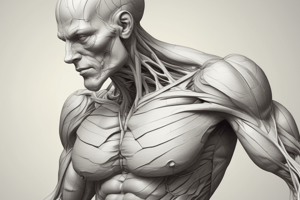Podcast
Questions and Answers
Which muscle is primarily responsible for elevating the ribs during inhalation?
Which muscle is primarily responsible for elevating the ribs during inhalation?
- Internal intercostals
- Diaphragm
- External intercostals (correct)
- Rectus abdominis
What is the main action associated with the orbicularis oris muscle?
What is the main action associated with the orbicularis oris muscle?
- Flexing the trunk
- Rotating the head
- Lifting the ribs
- Closing and puckering the lips (correct)
Which of the following muscles functions to compress the abdomen?
Which of the following muscles functions to compress the abdomen?
- Transverse abdominis (correct)
- Rectus abdominis
- Iliopsoas
- Diaphragm
From where do the internal intercostal muscles originate?
From where do the internal intercostal muscles originate?
What is the primary function of the temporalis muscle?
What is the primary function of the temporalis muscle?
Flashcards
Temporalis
Temporalis
A muscle located on the side of the head that helps in chewing.
Masseter
Masseter
A thick muscle that plays a key role in the chewing process.
Diaphragm
Diaphragm
A dome-shaped muscle that separates the chest from the abdomen and aids in breathing.
Rectus abdominis
Rectus abdominis
Signup and view all the flashcards
Internal oblique
Internal oblique
Signup and view all the flashcards
Study Notes
Muscles of the Head and Face
- Temporalis: Muscle involved in chewing
- Masseter: Muscle involved in chewing
- Orbicularis oculi: Muscle responsible for closing the eyes
- Orbicularis oris: Muscle used for closing and shaping the mouth
- Occipitofrontalis: Muscle responsible for facial expressions like raising eyebrows and furrowing the brow.
Chest and Abdomen Muscles
- External Intercostals: Elevates ribs during inhalation.
- Internal Intercostals: Depresses ribs during exhalation.
- Diaphragm: Main muscle for breathing
- Iliopsoas: Hip flexor muscle.
- Rectus abdominis: Flexes the trunk
- External oblique: Flexes and rotates the trunk
- Internal oblique: Flexes and rotates the trunk
- Transverse abdominis: Compresses the abdomen
Muscle Functions
- Breathing: Muscles like the intercostals and diaphragm work together to support and regulate breathing.
- Posture: Many head and facial muscles as well as chest and abdominal muscles all contribute to posture and postural support
- Exercise: Muscles are often used in specific exercises like running or yoga practice.
Studying That Suits You
Use AI to generate personalized quizzes and flashcards to suit your learning preferences.




